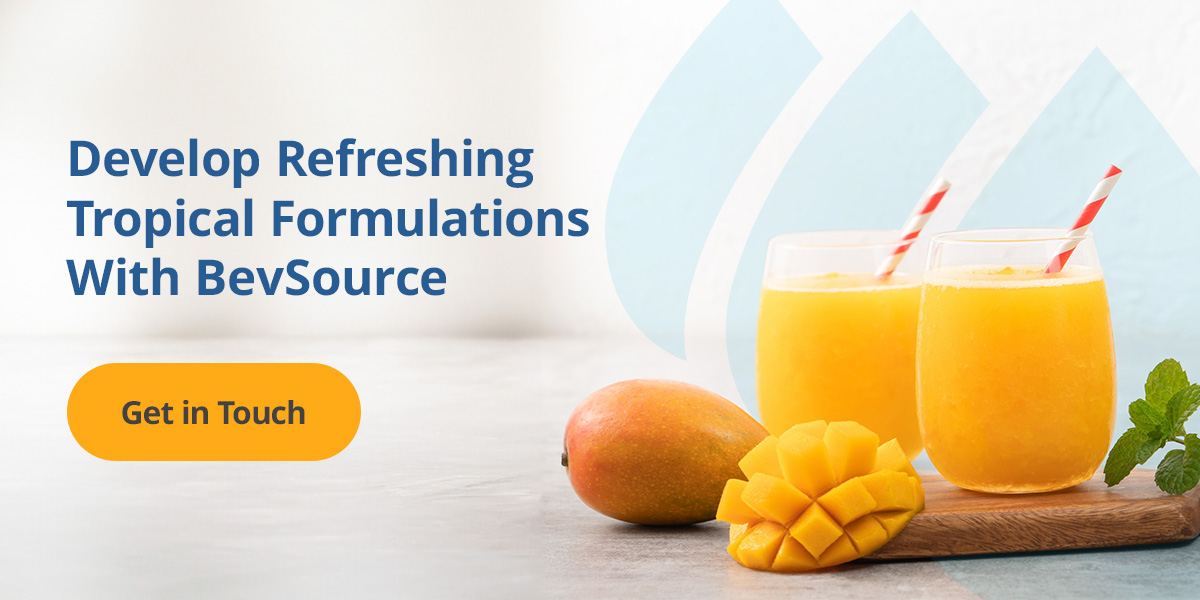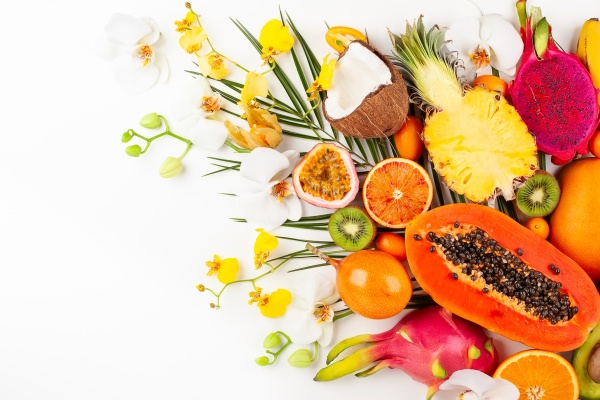Tropical Infusions: Exploring Tropical Beverage Trends and Creating Refreshing Formulations

Each year, as summer rolls around, consumers look for refreshing, exotic, tropical flavor combinations for beverages. While tropical ingredients are a mainstay for many beverage brands, they must rethink their formulation approach to stay on top of trends. Consumers are becoming more adventurous and expect more functional benefits with their drinks.
Beverage brands are rising to the occasion. Their latest offerings are innovative and unique, and they're blending traditional and retro flavors with delicious tropical notes. While they've always seen a rise in popularity during the summertime, tropical ingredients are gaining even more traction now amid the functional beverage trend. Plus, tropical ingredients meet consumer demands for natural ingredients with limited enhancements. Understanding tropical beverage trends is the first step toward formulating a beverage that excites and intrigues today's beverage consumer.
Exploring the Latest Trends in Tropical Beverage Infusions
The onset of summer reawakens consumer preferences for light, fruity, refreshing beverages. Vibrant summer fruits are known for their robust, sweet and tangy flavors. They evoke images of long beach holidays and sultry summer nights.
Beverage brands are rising to the demand by putting a unique spin on traditional tropical beverage infusions. We're seeing a rise in floral flavors, functional ingredients and unique flavor combinations that spark consumer imaginations. Explore some of the latest trends in tropical beverages.
Floral Flavors
Floral flavors are proving immensely popular. Their subtle, aromatic profiles hint at the exotic, providing consumers with a unique sensory experience. Pairing floral notes with traditional tropical flavors is an ideal complement to the fruits' tanginess. Hibiscus, cherry blossom, violet, jasmine and orange blossom are gaining popularity as consumers look beyond traditional tropical flavors. Additionally, elderflower and lavender provide soothing sophistication.
Unique Flavor Combinations
Beverage brands are pairing tropical and citrus flavors to develop unique flavor combinations. For a zesty flavor profile, expect to see citrus notes, such as lemon, lime and grapefruit. These combinations appeal to consumer taste preferences and offer rich and exciting colors. They also appeal to the overarching consumer trend toward health and wellness and to brands focused on formulating natural, unsweetened beverages.
Bring on the Spice
Consumers are looking for exciting, novel flavor combinations. They're willing to try new things. Many brands are blending spicy and sweet flavors, like adding chili to tropical fruits like mango, pineapple and watermelon. These "sweet and heat" fusions will likely gain traction in the coming months. Even "sweet" spices like cinnamon, nutmeg and vanilla are becoming popular for consumers seeking a blend of novelty and sophistication.
What Is Driving Tropical Beverage Trends?
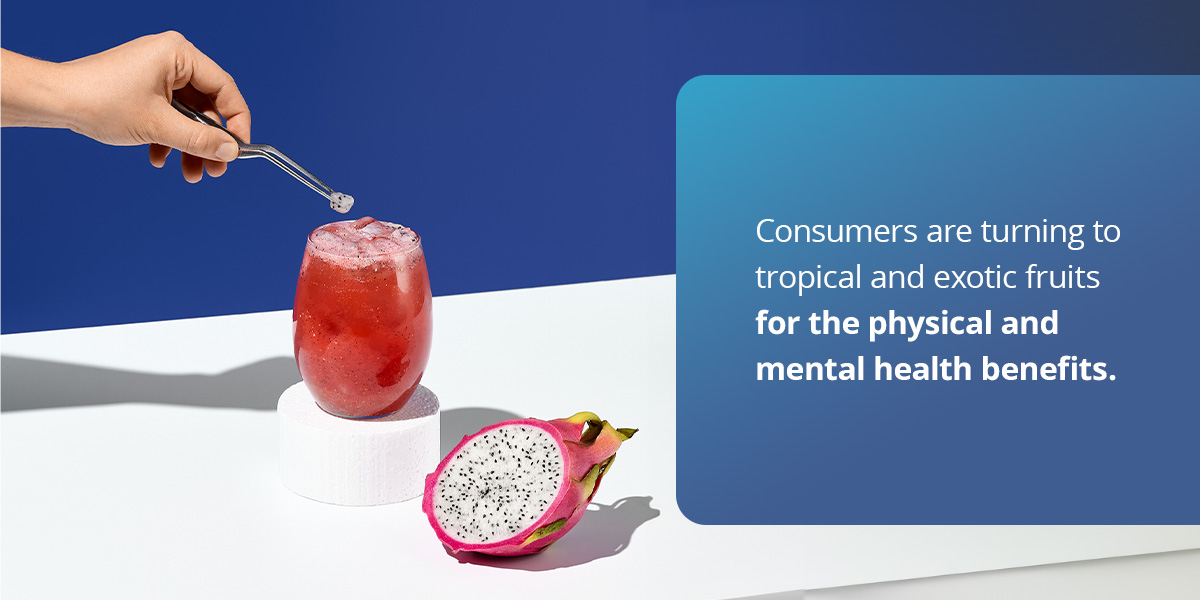
Consumers want beverages that meet their individual needs and preferences. They seek to blend these needs with fond summer memories and hydration as the warmer months roll around. They're turning to tropical and exotic fruits for the physical and mental health benefits. For beverage brands, variety is the key to formulating successful tropical drinks. Some of the principal drivers behind the current tropical beverage trend include the following.
Health and Wellness Trends
Health trends remain on an upward curve as consumers pay more attention to what they eat and drink. They want their beverages to align with their overall health goals, which differ from person to person. Plant-based products are in demand, and functionality is a baseline expectation among this target market.
Many consumers are moving away from heavily sweetened, highly caffeinated beverages. However, their flavor expectations remain. Tropical flavors provide a natural sweetness, color and flavor combination that satisfies multiple consumer demands, from flavor to hydration and nutrition. Many brands are adopting a "less is more" approach, letting unique, natural flavor combinations speak for themselves. This broad health and wellness focus also inspires the addition of florals and botanicals.
Summer Nostalgia
People are seeking new ways to enjoy traditional spring and summer flavors. The warm seasons always bring a sense of nostalgia, and brands can embrace consumer desires to revisit old memories. Retro beverages are making a comeback, with many brands combining traditional flavors with modern functionality to develop a new take on the classics. Melding these nostalgic flavors with a sense of novelty makes consumers feel simultaneously comfortable and adventurous. They know, in part, what to expect.
Understanding Tropical Flavors
Tropical fruits, like pineapple, mango, coconut and passionfruit, are characterized by their sweetness, intensity and exotic profiles. They conjure images of island vacations while being high in bioactive compounds and health-promoting properties. Many have high levels of vitamins. For example, mangoes contain vitamin A, while pineapple and passionfruit contain high vitamin C content.
Coconut water is taking center stage as consumers gravitate toward low-sugar, low-calorie options. It offers considerably fewer calories and significant hydration benefits while remaining completely natural. More brands include coconut water in their formulations, from sports drinks to sparkling beverages, as it allows them to add functional benefits to their list of claims.
For beverage brands, tropical fruits offer considerable benefits. They are versatile and flavorful and blend easily in pureed or clarified forms. Purees pack a flavor punch, making them an excellent addition to nectar drinks, and clarified versions are mild, working as a fantastic base for multiple blends. Many tropical flavors are familiar to consumers, and new blends hint at a sense of adventure, pushing them out of their comfort zone.
Blending Functional Drinks With Tropical Flavors
People expect more from their beverages than ever, and functional ingredients have seen a meteoric rise in recent years. Tropical ingredients are perfectly positioned to meet increasing functionality demands — they integrate well into beverage formulations, and many offer functional benefits of their own. For example, acai helps support immune health with its naturally occurring antioxidants and anthocyanins.
Tropical Ingredients With Functional Benefits
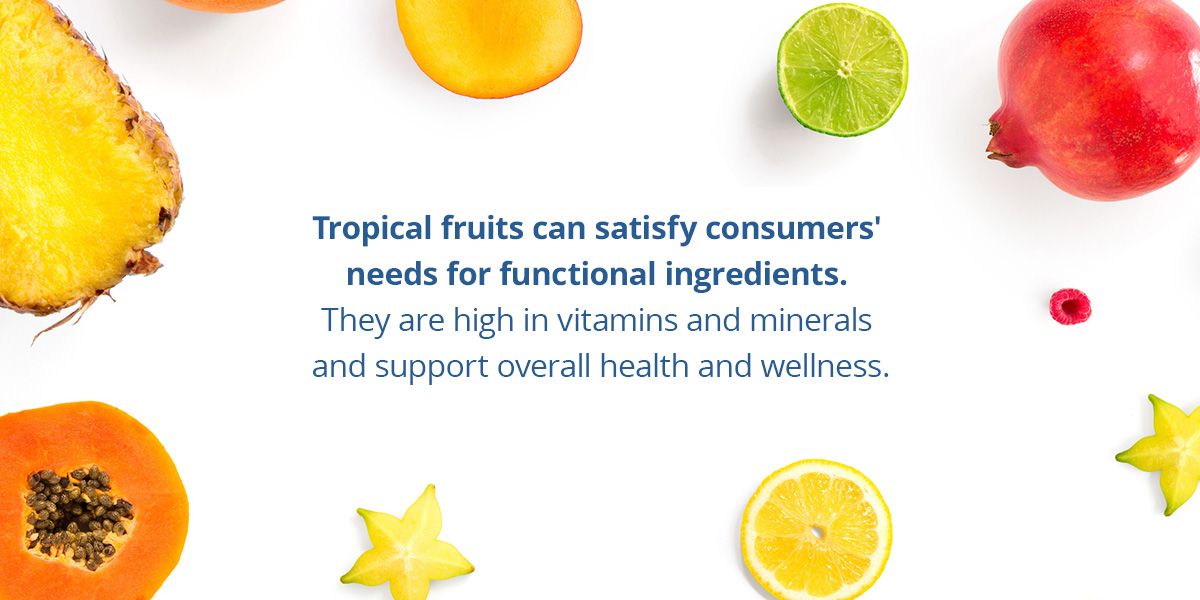
Tropical fruits can satisfy consumers' needs for functional ingredients. They are high in vitamins and minerals and support overall health and wellness. According to iTi Tropicals, consumers seek natural approaches to health and want to find functional products that offer benefits like boosting immunity, improving gut health and boosting mental focus. Tropical ingredients can help fulfill these needs. For example, many brands use coconut water as a base because it provides ultimate hydration and is high in electrolytes like sodium, potassium and magnesium.
Nootropics for Cognitive Benefits
Brands are finding increasingly innovative ways to blend tropical flavors with nootropic ingredients to provide increased cognitive function and mental stamina. They continue experimenting with nootropic ingredients like B vitamins, ginkgo biloba and taurine to appeal to diverse audiences.
Although caffeine remains a popular nootropic option, consumers are becoming wary of increasing their energy levels at the expense of other health benefits. Brands are responding with less caffeine and more tropical combinations, such as bananas for sustained energy and fruits high in vitamin C, like mango and pineapple. Vitamin C is a powerful antioxidant that has been shown to help with learning and memory. Nootropic tropical blends are common in several beverage markets, from sports and energy drinks to health beverages.
Adaptogens for Calm Focus
Adaptogens help us respond to stress. Along with botanicals, adaptogens are taking the beverage industry by storm, as they help modulate stress responses and inspire a calm focus. Adaptogenic mushrooms, in particular, are becoming increasingly popular. For example, reishi has immune-boosting properties, while lion's mane improves focus and overall cognitive function. Rhodiola rosea, ginseng, ashwagandha, ginger and turmeric are also popular adaptogenic alternatives.
Combining tropical fruits with adaptogenic ingredients accomplishes several goals for beverage brands. First, these combinations can provide several functional and health benefits. Tropical ingredients can also mask the flavor of some adaptogens, allowing consumers to enjoy the benefits without impacting the taste experience.
Sustainable Sourcing of Tropical Ingredients
The consumer focus on sustainability is another massive driver of beverage trends. At least 65% of consumers want to make healthy and sustainable purchasing choices, making sustainability a top priority for many beverage formulators. Many beverage brands are changing their offerings to include eco-friendly, recyclable packaging, allowing consumers to make choices that align with their values.
People also care more about the ethical, sustainable sourcing of ingredients. They want to understand the supply chain and its impact on broader environmental issues. The demand for natural, clean labeling is on the rise. In response, beverage brands are sourcing ingredients from producers who adhere to environmentally friendly practices and have systems and processes in place to reduce waste. They're gravitating toward locally sourced ingredients to reduce carbon emissions associated with transportation. Some brands are investing in initiatives that support farmers in adopting sustainable practices like water conservation and natural pesticides.
A Tropical Flavors List for Beverages
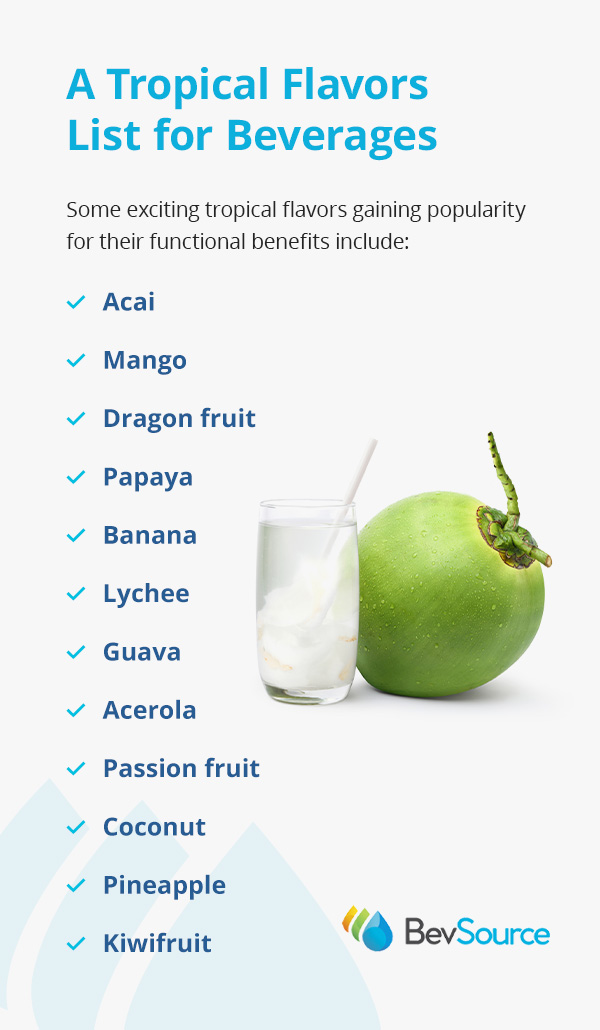
Consumers are combining traditional and exotic infusions to meet quality and sustainability standards while offering functional benefits. Some exciting tropical flavors gaining popularity for their functional benefits include:
- Acai: The acai berry has a unique flavor and texture that blends well in many beverage formulations. It's rich in antioxidants, omega-3 fatty acids and fiber, which provide health benefits like protecting cells from damage and potentially boosting brain function.
- Mango: Mango is another tropical fruit with a delightfully sweet flavor and vibrant color. It supports the immune system and promotes healthy skin. It's also low in calories, making it an excellent option for health and fitness enthusiasts.
- Dragon fruit: This exotic fruit boasts a vibrant, sweet flavor. It's low in calories and packed with nutrients and antioxidants to help maintain gut health, boost immune system functioning and reduce cholesterol.
- Papaya: This sweet, fibrous fruit is ideal for many beverage formulations. It's a powerful antioxidant and rich in nutrients. This fruit can help fight inflammation and improve digestion. It also contains lycopene, which has been shown to reduce the risk of cancer.
- Banana: Bananas are berries with a well-loved traditional flavor and multiple proven health benefits. They improve digestion and gut health, boost energy levels and support post-exercise recovery.
- Lychee: This understated yet potent berry has a sweet and flowery flavor and is rich in vitamins and minerals. It also has immune-boosting properties and can support brain health.
- Guava: Guava has a delightfully sweet, tangy flavor. These exotic fruits are rich in vitamin C, which helps boost the immune system. It's also high in fiber, which supports digestion. The high levels of potassium may also support good heart health.
- Acerola: This pleasant-tasting berry boosts immune system functioning and may improve cognitive functioning and mental clarity. Just 100 grams of single-strength acerola contains twenty times the recommended daily intake of vitamin C, as well as essential minerals and vitamins like vitamin A, potassium, and calcium.
- Passion fruit: Yellow and purple passion fruit are gaining popularity in beverage formulation. Passion Fruit has an aromatic, exotic flavor and a vibrant natural orange hue. It's rich in antioxidants, nutrients and fiber, boosting the immune system and supporting heart health. Passion fruit is also high in magnesium, which has been shown to reduce stress and anxiety.
- Coconut: Various forms of coconut are popular in beverage formulation. Coconut has a mild, slightly sweet flavor that complements many other beverage ingredients. Coconut water is an excellent source of nutrients and electrolytes and provides excellent hydration, while coconut milk can aid in weight loss and reduce inflammation.
- Pineapple: This delicious fruit is known for its aromatic flavor and enticing yellow color. In addition to being an incredible source of vitamin C and antioxidants, pineapple can suppress inflammation and speed up recovery after strenuous activities.
- Kiwifruit: Like most tropical ingredients, kiwifruit is rich in vitamins and minerals. It's a delicious, flowery berry with a lively green color that helps maintain gut health, boosts immune function and strengthens bones.
Techniques for Infusing Tropical Flavors in Beverages
Tropical ingredients provide a feast for the senses, blending sweetness with vibrant colors, exotic flavors and pleasant scents. The sweetness often forms the foundation for unique and exciting flavor combinations. The aroma adds depth and complexity to each beverage, creating a memorable drinking experience.
Meeting today's consumer needs means incorporating functional ingredients in beverage formulations. With tropical ingredients, you have lots of options. Tropical fruits often offer functional benefits on their own, and beverage formulators can also infuse their functional beverages with tropical flavors. Infusing tropical flavors is often effective in masking ingredients — modulating or disguising any off-notes in the formulation.
Beverage formulation is part art and part science. Brands must balance sweetness and flavor, select and blend the perfect combination of ingredients where no single element dominates the overall experience, and meet their consumers' health and wellness preferences. Infusion is the most popular technique for flavor extraction. It involves drawing flavor from a solid like a fruit and adding it to a liquid like syrup. Depending on the desired result, infusions can be accomplished with heat, extensive periods at room temperature or freezing blasts of nitrous oxide.
Develop Refreshing Tropical Formulations With BevSource
As consumers embrace their sense of adventure, beverage brands have an exciting opportunity to capture their undivided attention. Tropical flavors' popularity expands across niche markets, allowing your brand to venture into new markets and embrace consumer preferences for natural, functional beverages. With exotic tropical fruits on the scene, you can embrace your creativity and take your place in an expanding market.
BevSource can support you during every stage of your journey through the beverage market. We will help you develop, formulate and source high-quality tropical fruit juices, concentrates and purees that meet diverse consumer needs. We are your one-stop shop and can accelerate your speed to market with our extensive skills, experience and connections. Let's talk. Speak to a beverage expert and start formulating your innovative tropical beverage today!
